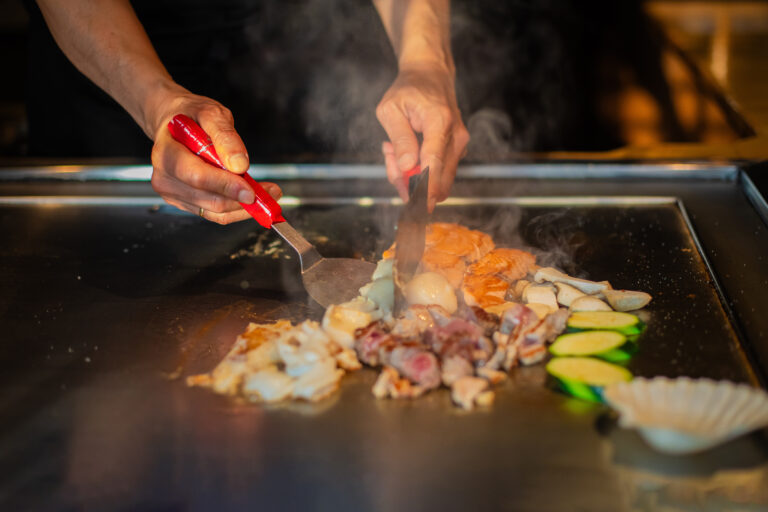When we think of hibachi cuisine, images of chefs performing dazzling culinary tricks over a sizzling grill often come to mind. While the entertainment value of hibachi cooking is undeniable, there’s another significant aspect that deserves attention: its health benefits. Hibachi food, known for its method of cooking on a high-heat metal cooking plate, offers a variety of nutritious dishes that can be a healthy choice for food enthusiasts. This blog explores why hibachi cuisine not only tantalizes your taste buds but also contributes positively to your health.
High-Quality Proteins
Hibachi grills typically feature a range of high-quality protein options, including chicken, beef, shrimp, and fish like salmon. These proteins are essential for building and repairing tissues, supporting immune function, and maintaining muscle mass. The direct grilling method used in hibachi cooking allows for fats to drip away from the food, resulting in lower fat content and fewer calories while retaining the rich flavors and nutrients of the meats and seafood.
Hibachi cuisine features a variety of protein options, each with its own set of health benefits:
- Chicken: A hibachi favorite, chicken is a lean protein that helps in muscle growth and development. It’s also a great source of essential vitamins such as vitamin B6, which is crucial for metabolic and cardiovascular health.
- Beef: Often served as tenderloin or sirloin in hibachi settings, beef is rich in high-quality protein and essential nutrients, including iron, zinc, and B vitamins. These nutrients are vital for blood formation, mental health, and maintaining immune function.
- Shrimp: Low in calories and high in protein, shrimp is an excellent seafood choice that also provides selenium and vitamin B12. Selenium plays a crucial role in maintaining thyroid health and antioxidant defenses, while B12 is essential for nerve tissue health and the production of red blood cells.
- Salmon: Known for its high omega-3 fatty acid content, salmon can reduce inflammation and lower the risk of chronic diseases such as heart disease, cancer, and arthritis. It’s also a fantastic source of Vitamin D, crucial for bone health and immune function.
These proteins are grilled to perfection on the hibachi, using minimal oil and seasonings, which preserves their natural flavors and health benefits while minimizing unnecessary caloric intake from added fats.
Abundance of Vegetables
A standard feature of hibachi meals is the generous use of fresh vegetables, which are grilled to perfection alongside the proteins. Common vegetables include onions, zucchini, mushrooms, bell peppers, and carrots. Grilling vegetables on the hibachi enhances their natural sugars, making them sweeter and more flavorful, which can be a great way to encourage increased vegetable consumption. These vegetables provide essential vitamins and minerals, contribute to daily fiber intake, and are loaded with antioxidants that help fight free radicals in the body.
Hibachi grills showcase a vibrant array of vegetables, each contributing valuable nutrients to the diet:
- Onions and Bell Peppers: Both are excellent sources of vitamin C, which is not only a powerful antioxidant but also helps in repairing tissues, healing wounds, and maintaining the health of bones and teeth.
- Zucchini and Carrots: Zucchini is low in calorie and high in potassium and manganese, while carrots are an excellent source of beta-carotene, which is converted into vitamin A in the body. Vitamin A is essential for good vision, skin health, and proper immune function.
- Mushrooms: Often overlooked as a significant health food, mushrooms are high in B vitamins, such as riboflavin and niacin, which help the body release energy from food and maintain healthy red blood cells. Some varieties of mushrooms also contain vitamin D.
- Garlic: Frequently used in seasoning hibachi dishes, garlic has been shown to have anti-inflammatory properties and may help lower cholesterol and blood pressure levels.
Other Reasons Why Hibachi Cuisine is Healthy
Hibachi chefs typically use healthier cooking oils, such as canola or olive oil, which are high in monounsaturated fats and have a higher smoke point ideal for high-temperature cooking. The use of these oils in moderation contributes to heart health and helps maintain healthy cholesterol levels. Moreover, the fast cooking process at high temperatures ensures that the food does not absorb too much oil, keeping the fat content relatively low.
The flavor in hibachi cooking comes from the fresh quality of the ingredients and the skill of the chef, rather than heavy reliance on processed sauces and seasonings. Hibachi dishes are often seasoned with simple, natural ingredients like soy sauce, lemon, garlic, and ginger—all known for their health benefits. Soy sauce provides an umami flavor and contains antioxidants, ginger is renowned for its anti-inflammatory properties, and garlic has been shown to boost immunity.
At a hibachi grill, chefs prepare your meal in front of you, which allows for direct communication about portion sizes. Guests can request the amount of food that suits their dietary needs, which helps in managing portion control—a key element in maintaining a healthy weight.
A typical hibachi meal consists of a balance of macronutrients: proteins, carbohydrates from rice or noodles, and fats from the cooking oils. This balance is crucial for a well-rounded diet that supports energy needs without overindulgence. The inclusion of all food groups ensures that diners receive a variety of nutrients required for a healthy diet.
For those watching their calorie intake, hibachi cuisine offers plenty of low-calorie options. Diners can choose to fill their plates with more vegetables and lean proteins while opting for smaller portions of fried rice or noodles, or substituting white rice with brown rice or additional vegetables.
Lastly, the rapid cooking process used in hibachi grilling not only retains the ingredients’ nutritional value by preserving vitamins and minerals that might be lost in longer cooking processes but also prevents the formation of harmful compounds that can occur when food is overcooked.
Try Our Healthy Hibachi Catering
Hibachi cuisine offers more than just a meal; it provides a healthy, balanced diet option that doesn’t skimp on flavor or entertainment. Whether you are dining out or hosting a hibachi night at home with services like Bruce Hibachi at Home, you can rest assured that you are making a deliciously smart choice for your health. So next time you sit down in front of a hibachi grill, know that you’re not just in for a treat for your senses, but also a boon for your well-being.

